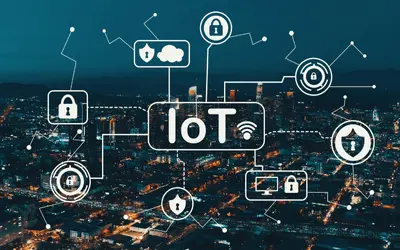The Internet of Things (IoT) is a revolutionary concept that connects common gadgets to the internet, allowing them to transmit and receive data, communicate with one another, and carry out activities autonomously. This network of connected devices includes anything from domestic appliances and wearable technologies to industrial machinery and metropolitan infrastructure. The Internet of Things is changing the way we live, work, and interact with our surroundings by enabling seamless connectivity and automation.
Applications of IoT
IoT applications span a wide range of industries, dramatically improving efficiency, production, and convenience. In smart homes, IoT equipment such as thermostats, lighting systems, and security cameras may be managed remotely, learning user preferences to optimise energy consumption and security. Wearable gadgets, such as fitness trackers and smartwatches, track health parameters in real time and promote healthier living.
IoT is transforming operations in manufacturing and logistics by enabling predictive maintenance, inventory management, and supply chain efficiency. Connected sensors on machinery can detect possible flaws before they cause malfunctions, lowering downtime and maintenance costs. Furthermore, IoT-enabled tracking solutions improve supply chain visibility, ensuring that products arrive effectively and on time.
The healthcare sector is likewise seeing tremendous advances as a result of the Internet of Things. Remote monitoring technologies enable healthcare personnel to track patients’ vital signs and health issues in real time, resulting in better patient care and more timely treatments. Smart medical devices and IoT-enabled wearables can collect and communicate data to healthcare specialists, allowing for more individualized treatment plans and improved management of chronic conditions.

The Transformative Impact of the Internet of Things
The revolutionary impact of IoT goes beyond individual apps, propelling the evolution of entire ecosystems. Smart cities, for example, use IoT technology to improve urban living by implementing intelligent transportation systems, effective waste management, and smart grids. IoT sensors can track traffic patterns, optimize public transit routes, and minimize congestion, whilst smart meters can help regulate energy consumption and reduce environmental effect.
Furthermore, IoT is driving agricultural innovation through precision farming approaches. Connected sensors in the field can monitor soil conditions, weather patterns, and crop health, giving farmers data-driven insights to improve irrigation, fertilization, and pest management. This not only enhances crop yields but also encourages environmentally friendly farming techniques.
Finally, the Internet of Things (IoT) is transforming how we interact with the world around us. IoT improves efficiency, productivity, and convenience in a variety of industries by connecting devices and allowing for better interactions. As IoT technology advances, its ability to alter industries and improve our daily lives becomes nearly endless. Embracing the linked world creates new chances for innovation and progress, making our lives more interconnected and smarter.